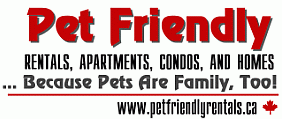Developing a Pet Policy

|
Below are a few issues you may wish to address when drafting your pet policies. Provide tenants with a copy of your "pet rules" and have both of you sign it. You may want to consult with a qualified professional for assistance in drafting a suitable document.
Number and types of pets permitted
Establish a reasonable number of pets a tenant is permitted within his or her unit, and state the types of pets allowed (dogs, cats, caged pets...). Keep in mind that many people have more than one pet, as pets like companionship, too, especially when their people are out! "Exotic" animals are usually not appropriate as pets.
If you live in a condominium complex, your contract may already set out conditions for pets in the units. One example is a condo that permits dogs and cats but disallows birds (some birds can be quite vocal and may disturb the neighbours).
Remember that the size of a pet doesn't necessarily dictate its behavior - for instance, many large dogs are well-behaved and quiet.
If you want the tenant to get permission from you prior to adopting another pet, be sure to state this in the agreement.
Containing / Confining Pets
Tenants should keep pets within his or her unit. Pets should not be permitted to roam free, including when unattended on balconies, patios, decks, etc. Cats should be transported in carriers when moving through common areas, and dogs should be on a short leash.
On-Site "Pet Areas"
Provide details if there are specific areas on the property which are available for exercising pets.
Pet Waste Disposal
Specify where pet waste should be disposed (eg. is there a specific garbage can, and if so, where is it located?), and how (eg. double-bagged).
Noise or Disturbances
Excessive barking, meowing, or other pet-related noises can disturb other tenants and neighbours. Define what level of noise is unacceptable.
Likewise, pets should not be permitted to behave in an uncontrolled manner (harassing other tenants, relieving themselves in hallways, etc).
Emergencies
State the procedure if you have reason to believe there is an emergency situation involving the tenant's pet (fire, flood, abandonment, etc). For instance:
- You should be able to enter the rental unit if your attempts to reach the tenant (or their emergency contact) are unsuccessful.
- In some cases, you might require the assistance of local authorities such as the humane society or animal control.
- The pet may also require boarding.
- Who is responsible for the costs incurred by any of the above.
Damages Caused by Pets
Tenants are responsible for any damages caused by their pets.
If your rental unit is located in an area where fleas or ticks are a concern, then you may wish to ask tenants to ensure pets are on a recognized flea preventive (or they could be responsible for the cost of treating the area).
What To Do In Case of a Violation
Specify what happens if there is a complaint, or if the tenant is alleged to have violated a part of the pet policy agreement.
Your local landlord / tenant board for may be able to provide you with more information, specific to your area, about renting to people with pets.
More for Landlords Considering Accepting Pets:
- How Adopting a Pet-Friendly Policy Benefits You
- Common Concerns About Accepting Pets
- Drafting a Pet Application Form
- Renting to Responsible Pet Owners: A Checklist for Landlords

